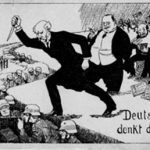Senior legislature in Great Britain and Northern Ireland in the Houses of Parliament comprises the Sovereign (Head of State), and the Lower and Upper Chamber, known as the House of Commons (or commoners) and the House of Lords respectively. Together, these chambers occupy the Palace of Westminster. The latter (in Parliament Square, London) may look medieval or Gothic, but it is a 19th century building designed by the architect of St. Pancras Station.
In the thirteenth century parliament was merely a meeting place for the king and his selected officials, plus the most powerful lords. In 1265 it became for the first time partly representative, in what is called Simon de Montfort’s Parliament, containing commoners (knights of the shires and burgesses of the boroughs) who were elected in the places where they lived. By the reign of Edward I there was a Model Parliament in England (1295). Though the king and most of his dukes and earls still held supreme power, historians must at least accept that a form of democracy existed in England, therefore, at the end of the thirteenth century.
The Commons and the Lords grew in stature and power until the sixteenth century, maintaining a not always easy relation with the crown. Kings of England needed, if they had any sense, to live cheek to jowl with Parliament, because it was Parliament that voted them the cash needed for such kingly pursuits as wars or the acquiring of property. One King, Henry VIII, used Parliament to expedite the judicial murder of two of his wives and the reformation of the Church, indeed, his was called The Reformation Parliament (1529 – 36).
Poor Charles I, a Stuart, chose to oppose Parliament, even trying to manage Britain without it (1629 – 40). Sadly, it was indispensable, and when Charles tried to summon a Parliament to raise money, both Commons and Lords, led by one John Pym, refused to vote him any. This, along with other matters, led to the only true British Civil War (the Wars of the Roses do not count, as they were a series of battles fought between private armies for dynastical motives and hardly involved ordinary people). Parliament won the war against the King, led by Oliver Cromwell, and ended it by committing regicide on a freezing morning, just outside the Palace of Whitehall.
Charles had children, however, and one of them became Charles II after the Restoration (1660), which itself was negotiated by Parliament. Commons and Lords also orchestrated the removal of (Catholic) James II and the invitation to (Protestant) William of Orange, who became joint monarch of England with his wife Mary (1688). The Act of Settlement (1701) comfortably settled the relationship of Crown, Lords and Commons, but it also established the supremacy of the House of Commons. This was the beginning of Britain’s democratic problems, as members of parliament tended from this time forward to be professional politicians, which means they had interests which were not necessarily the interests of Britain.. The Lords tended to be well enough off not to have to rely on any financial benefits that being members of a parliament could give them. They were thus less open to corruption.
By the twenty-first century the professionals in the Commons had got rid of the Lords effectively, by refusing to allow hereditary lords to occupy their rightful seat. The hereditary peers have been replaced by individuals raised to the peerage, with the political interests of their political party foremost in mind.
The House of Commons is unique in that debate, as such, is often rowdy or even nonsensical; rarely mesmerising. The Speaker, who should be of irreproachable integrity and immense respectability, very often isn’t. Debates leading to the passing of bills or acts can resemble a bear garden, or a fighting-cock pit, though Members address each other as ‘The Honourable Member for Soandso’. Great parliamentarians are and always have been great debaters, and the English public schools, with their intensely competitive debating societies, are ideal breeding grounds for members of Parliament. The Grammar Schools (until their demolition by Shirley Williams) have also produced great parliamentary speakers, such as Edward Heath and Margaret Thatcher. But, like it or not, it is Eton and Harrow, Winchester and Marlborough, Repton, Rugby and The Charterhouse that have given the British the greatest quantity of exemplary speakers.









Leave A Comment